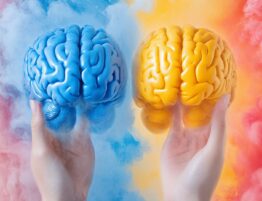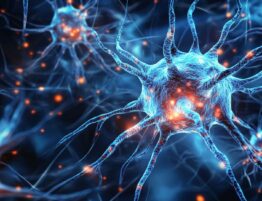Have you ever felt like the world around you was fuzzy or unclear? Have you ever had confused thoughts? Everyone experiences this feeling at least sometimes. This condition significantly impairs the quality of life. You cannot think clearly and concentrate on anything important. This condition is commonly known as brain fog. Let’s explore it. This is a collection of cognitive impairments. They can make it harder to think clearly, focus, and retain information. People experiencing brain fog often report feelings of mental fatigue and confusion. This condition can significantly disrupt work and personal life.
The effects extend beyond just difficulty remembering details or staying on task. It can also influence emotional well-being, causing frustration or anxiety. Addressing the root causes of brain fog is crucial for improving cognitive function. It also restores clarity. Ignoring or dismissing these symptoms can have long-term effects on overall well-being. This makes it essential to explore ways to manage and alleviate this condition for better quality of life.
The Key Causes of Brain Fog
Brain fog can be triggered by many factors, including lifestyle habits, stress, and even underlying medical conditions. Common causes of the brain fog include:
- Poor Nutrition: An inadequate diet means lacking in vitamins, minerals, and healthy fats. It can significantly affect cognitive function. Deficiencies in B vitamins, omega-3 fatty acids, or magnesium may cause the brain fog.
- Stress: Chronic stress is one of the leading contributors to brain fog. The constant release of cortisol, the stress hormone, can impair memory, attention, and focus. This makes it difficult to maintain mental clarity.
- Lack of Sleep: Poor-quality sleep can impair brain function. Sleep deprivation disrupts memory consolidation and reduces focus. All of these signs contribute to brain fog.
- Medical Conditions: Chronic tiredness syndrome and autoimmune disorders can exacerbate a brain fog. These medical issues interfere with normal brain function and worsen mental clearness.
- Fatigue and Overworking: Consistently overworking without adequate sleep can lead to mental exhaustion. This condition makes it harder to concentrate and think clearly. It increases the likelihood of experiencing confusion.
The Role of Stress and Stress Management
Chronic stress has a profound impact on cognitive abilities. Prolonged exposure to cortisol can disrupt brain processes, impairing memory, attention, and decision-making. Stress management is crucial for protecting brain health. Anxiety can lead to confusion, reduced focus, and emotional strain. Effective stress reduction techniques can significantly improve mental clarity and overall well-being:
- Mindfulness and Meditation: Practicing these techniques helps to calm the mind. It reduces cortisol levels and improves focus. Taking even a few minutes each day to focus on breathing can enhance cognitive function.
- Physical Activity: Regular exercise boosts the release of endorphins. It helps counteract the effects of stress, improving mood and mindfulness clarity.
- Relaxation Techniques: Deep breathing exercises and yoga can reduce physical tension. They promote a relaxed state and clearer thinking.
- Time Management: Organizing tasks and setting realistic goals help alleviate the overwhelming. It promotes better stress management and focus.
- Adequate Sleep: Prioritize sleep and recovery. The lack of sleep exacerbates stress and impairs cognitive abilities.
Nutrition’s Impact on Mental Clarity
The food we eat plays a crucial role in supporting mental clarity and overall brain health. A well-balanced diet provides the necessary nutrients that fuel the brain. They also protect against cognitive decline. Proper diet can improve focus, memory, and mental sharpness. Poor eating habits can lead to sluggishness and decreased performance:
- Omega-3 Fatty Acids: These nutrients are found in fatty fish, flaxseeds, and walnuts. Omega-3s are essential for maintaining healthy brain cells. They improve memory, attention, and overall cognitive abilities.
- Antioxidants: Foods rich in berries, dark leafy greens, and nuts, help reduce oxidative stress in the brain. Such nutrition protects against damage and inflammation. It can impair mental clarity.
- B Vitamins: B6, B12, and folic acid, are vital for brain health. They support neurotransmitter function and help combat confusion by reducing homocysteine levels. They are generally linked to cognitive decline.
- Magnesium: This mineral is present in spinach, almonds, and avocados. It is crucial for nerve function and helps to manage stress. Magnesium promotes clearer thinking.
Following a nutrient-rich diet can boost mental clarity and support long-term cognitive function.
The Importance of Quality Sleep in Reducing Brain Fog
Quality sleep is essential for maintaining mental clarity. During sleep, the brain consolidates memories, clears toxins, and processes emotions. Poor or insufficient sleep can lead to confusion. This is a state of mental forgetfulness and lack of focus. When we don’t get enough restorative sleep, cognitive abilities are generally impaired. They include memory, decision-making, and problem-solving.
Lack of quality sleep can also disrupt the balance of important brain chemicals. They affect mood and cognitive performance. Confusion often occurs after nights of poor sleep. This leaves individuals feeling mentally drained, less alert, and emotionally unbalanced.
Here are practical tips to improve sleep quality:
- Create a Consistent Routine: Try to go to bed and wake up at the same time every day. Do it even on weekends. This helps regulate your body’s internal clock. It also improves sleep quality over time.
- Optimize Your Sleep Environment: Make your bedroom conducive to sleep. Keep it cool, dark, and quiet. Consider blackout curtains, earplugs, or white noise machines. They will block out distractions.
- Watch Your Diet: Avoid caffeine or heavy meals late in the day. They can disrupt sleep and contribute to brain fog.
- Limit Screen Time Before Bed: The blue light can interfere with the production of melatonin. It is a hormone that regulates sleep. Try to avoid screens for at least an hour before bed.
- Relaxation Techniques: Engage in calming activities before bed. They are reading, meditation, or deep breathing exercises. These activities signal to your brain that it’s time to unwind.
Solutions for Enhancing Cognitive Function
Improving cognitive abilities requires a holistic approach. It integrates lifestyle changes, physical activity, mental exercises, and healthy habits. You should prioritize these actionable steps. So, you can sharpen your mind and enhance overall brain health.
Here are some key strategies to improve cognitive function:
- Regular Exercise: Physical activity is one of the most effective ways to enhance mental clarity. Exercise increases blood flow to the brain. They promote the growth of new neurons, and improve memory. Aim for at least 30 minutes of moderate exercise, like walking, cycling, or yoga, most days of the week.
- Stay Hydrated: Dehydration can impair brain function. Drinking enough water throughout the day supports cognitive performance. It helps to keep the brain alert and focused.
- Balanced Diet: A nutrient-dense diet is essential for optimal brain health. Incorporate foods rich in antioxidants, omega-3 fatty acids, and vitamins. Healthy nutrition will support cognitive abilities. Leafy greens, berries, nuts, and fish are excellent choices.
- Brain Training and Mental Exercises: Engage in activities that stimulate it. They include puzzles and reading. Such activities also involve learning a new skill or memory games. Such exercises improve neuroplasticity and can boost memory, focus, and problem-solving skills.
- Sleep and Stress Management: Controlling these aspects is possible through some techniques. They include mindfulness or meditation. These techniques are vital for maintaining mental clarity.
- Social Interaction: This is important to engage in meaningful activities and conversations. They help to stimulate the brain. It keeps cognitive function sharp. Connecting with others also supports emotional health. This is important for overall brain function.
Consider adopting these habits. So, you can significantly improve cognitive abilities and reduce the impact of fatigue. You will ultimately boost brain health.
Maintaining Long-Term Mental Clarity
Maintaining mental clarity over the long term requires a holistic approach. It addresses multiple aspects of brain health. Simply focusing on one area may not be enough. Instead, a balanced strategy that incorporates various healthy habits is essential. It combats confusion and enhances cognitive abilities. Here are points to consider:
- Managing Stress: Chronic stress is one of the leading causes of confusion. You should incorporate stress-reduction techniques like mindfulness, meditation, or regular exercise. So, you can mitigate the negative effects of stress on the brain.
- Optimizing Nutrition: Diet is fundamental in cognitive health. A balanced diet rich in omega-3 fatty acids, antioxidants, and B vitamins supports brain function. It reduces inflammation and helps prevent confusion. Foods like leafy greens, fatty fish, and berries should be staples in your diet.
- Improving Sleep: Sleep is vital for consolidating memories and clearing toxins from the brain. Prioritizing quality sleep helps restore mental clarity. It also reduces the risk of cognitive decline.
- Maintaining Healthy Habits: Regular physical activity, stay hydrated, and foster social connections. These habits are all important for overall brain health. These habits work synergistically to promote mental sharpness and prevent confusion.
Try to adopt a well-rounded lifestyle. So, you take control of your mental clarity. You also improve your cognitive function and your quality of life. Embrace these habits today, and invest in your long-term brain health. This is essential for a vibrant future. Do you need professional help? Contact us.













Please, leave your review
Write a comment: